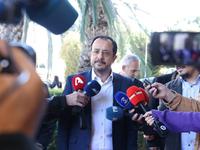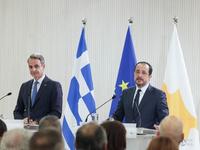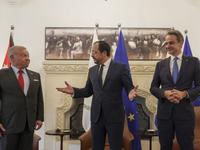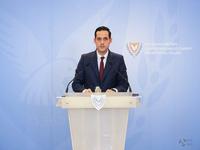Ανακοινωθέντα

31-01-2019 09:15
Το Συμβούλιο Ασφαλείας ανανέωσε τη θητεία της UNFICYP για ακόμη έξι μήνες
Το Συμβούλιο Ασφαλείας των Ηνωμένων Εθνών, σε επίσημη συνεδρία την Τετάρτη, 30 Ιανουαρίου 2019, υιοθέτησε ομόφωνα το ψήφισμα με αριθμό S/RES/2453 (2019), που ανανεώνει τη θητεία της Ειρηνευτικής Δύναμης των Ηνωμένων Εθνών στην Κύπρο (UNFICYP), για ακόμη έξι μήνες, μέχρι την 31η Ιουλίου 2019.
Σημειώνεται ότι πριν από τη Σύνοδο του Συμβουλίου Ασφαλείας, ο Μόνιμος Αντιπρόσωπος της Κύπρου στα Ηνωμένα Έθνη, Πρέσβης Κορνήλιος Κορνηλίου, επέδωσε στον Ειδικό Απεσταλμένο για Θέματα Συμβουλίου Ασφαλείας της Δομινικανής Δημοκρατίας, η οποία ασκεί την προεδρία του Σώματος για τον μήνα Ιανουάριο, κ. José Singer, την επιστολή συγκατάθεσης της Κυβέρνησης της Κυπριακής Δημοκρατίας, ως φιλοξενούσας χώρας για την ανανέωση της εντολής της UNFICYP.
Το προσχέδιο του ψηφίσματος μπορείτε να το δείτε εδώ.
Αμέσως μετά την υιοθέτηση του ψηφίσματος, έλαβαν το λόγο για επεξήγηση της ψήφους τους, οι αντιπρόσωποι της Ρωσικής Ομοσπονδίας, του Ηνωμένου Βασιλείου, των Ηνωμένων Πολιτειών Αμερικής και της Κίνας.
Οι δηλώσεις τους στα αγγλικά ακολουθούν:
Μόνιμος Αντιπρόσωπος της Ρωσίας, Πρέσβης Vassily Benenzia:
“Thank you Mr President. Russia trusts that the adoption by the Security Council of the resolution 2453 will help UNFICYP implement its mandate to set up security conditions for a settlement on the island. The Cypriot settlement is one of the few agenda items of the Security Council where a fully unified position of its members helps to provide a solid international support for efforts of the Cypriot parties to achieve agreement on a comprehensive settlement on the basis of the UN resolutions. The reason for the consensus is the balanced position of the Council and [the fact that the issue] concerns the Cypriots themselves.
However, we regret the fact that one delegation is making attempts to use the sensitive situation on the island to put forward its own position on this. This [position] does not have a direct relationship to the settlement. This hampers the search for consensus and decreases the effectiveness of the work of the Council. We would like to remind you that general peacekeeping matters that impact all peacekeeping operations of the UN, should be discussed in the Special Committee on Peacekeeping, with the participation of troops and police contributing countries. Such issues pertained also to the UN Secretary-General’s strategy for the performance policy framework that has not yet been settled.
We support the need for this work. However, a decision as to how such comprehensive documents would be applied should be dealt with in this Special Committee, once they’ve read the documents. Bypassing this robust body it is not acceptable especially because UN Secretary has not yet concluded his work on the document. We would like to remind you that the UN Secretary-General has asked, […] the document has not yet been implemented, but there are traditional practices here that should be observed. That is, it should not change the existing practice.
The traditional practice must be observed including the expertise of the Special Committee on Peacekeeping. This body “is the only UN forum which is instructed to deal with comprehensive matters of peacekeeping, including measures to improve UN’s ability to respond to peacekeeping operations.” We are convinced that during the upcoming meeting of the Special Committee, this would be given bigger priority. This pertains to all documents requiring approval by UN member states, including information gathering and analysis for peacekeeping intelligence. We trust that the members of the Council will be more responsible in their approach to discussing sensitive country issues, and would be more respectful of the prerogatives of the specialized intergovernmental bodies of the UN. And this would help us to increase the effect of the work of the Security Council. Thank you.”
Αναπληρωτής Μόνιμος Αντιπρόσωπος του Ηνωμένου Βασιλείου, Πρέσβης Jonathan Allen:
“Thank you, Mr President. The United Kingdom welcomes the unanimous adoption of Resolution 2453 today and the renewal of the mandate of the United Nations Peacekeeping Force in Cyprus. And I'd just like to thank all members of the Council for their support in bringing these negotiations to a successful conclusion.
We continue to be strong supporters of a just and lasting settlement to reunite Cyprus based on the internationally accepted model for a bi-zonal, bi-communal federation. And we endorse the Secretary-General's view the prospects remain alive for a comprehensive settlement. Through the unanimous adoption of this resolution today we are sending a clear message to all sides: to work towards the resumption of talks through constructive engagement with the United Nations consultant Ms Jane Holl Lute, and her work to reach agreement on terms of reference for resuming talks within a foreseeable horizon.
UNFICYP plays an important role in supporting the settlement process through its contribution to peace and stability on the island and in creating the conditions for settlement talks. At the same time it should also support a return to normal conditions on the island. We therefore welcome the emphasis in this resolution on enhanced dialogue and cooperation to build trust and mutual understanding between the communities, including our collective call for the sides and relevant parties to develop new mechanisms to achieve this.
We also support the continued focus on the important contribution of women, youth and civil society and the role of education in promoting a culture of peace and reconciliation. I took note of the Russian Representative's views on the language in OP17 of this resolution on cross-cutting peacekeeping issues. We tried very hard through this process to take all delegations' views into consideration and find a way through.
As Council members are aware, the language that we have used in this resolution is an exact replica of the language agreed upon by this Council in other peacekeeping mandates, including resolution 2445 on UNISFA, which we adopted unanimously in October 2018. The language in today's resolution needed updating since our last discussion six months ago to reflect the important developments on the integrated performance policy framework for all peacekeeping operations, including resolution 2436 on peacekeeping performance, which was adopted unanimously by this Council in September 2018. Our language closely mirrors that of resolution 2450 on UNDOF which was also adopted unanimously in December 2018 and on which the Russian delegation jointly led negotiations.
We do not accept the argument that the Special Committee on peacekeeping C34 must approve, endorse or authorize any new development in peacekeeping policy before the Secretariat can implement it.
The C34 plays a vital role in scrutinizing peacekeeping policy and making informed strategic and balanced recommendations on a range of policy issues in its report. However, as our Russian colleagues have rightly pointed out, the C34 is mandated to "comprehensive review" all aspects of cross-cutting peacekeeping policy. That does not imply that the C34 has a right of veto over policy implementation or that it can obstruct the Security Council's ability to make decisions on matters of international peace and security. We would not want to see the C34's functions exceeded under the powers prescribed under Chapter 4 Article 10 of the Charter.
Mr President, let me take the opportunity to express our thanks to Special Representative Spehar and her team for their work on the island during the last six months; to the Secretary-General for keeping his Good Offices at the disposal of at the parties; and to Jane Holl Lute for her ongoing consultations. The United Kingdom will continue to support the sides in their efforts to achieve a settlement and we stand ready to play our part in any future talks. Thank you Mr President.”
Αναπληρωτής Μόνιμος Αντιπρόσωπος των ΗΠΑ, Πρέσβης Jonathan Cohen:
Thank you, Mr President, and thanks to the UK delegations for their efforts to strengthen UNFICYP’s mandate to ensure it conveys the strong sentiment of the UN Security Council and the international community that peacekeeping operations must support political solutions and the urgency we see for the leaders of both the Greek Cypriot and Turkish Cypriot communities to come together. We appreciate your commitment, both as the penholder and as a troop-contributing country, to peace and stability in Cyprus.
We join the Council’s unanimous urging to the leaders of both Cypriot communities that they take immediate steps to rebuild trust, improve the public atmosphere, and resume talks toward a settlement.
The United States continues to support a comprehensive settlement to reunify the island as a bi-zonal, bi-communal federation, to benefit all Cypriots and the wider region, and we want to underscore the following:
First, while the United Nations has a critical role to play, the political process towards a settlement must be Cypriot-led. For a durable, lasting peace to take hold, the leaders must demonstrate the political courage and will to negotiate in good faith and with a sense of urgency. We urge the leaders to proactively engage UN consultant Jane Holl Lute to negotiate the terms of reference for resuming negotiations.
The leaders must also pursue their own lines of effort to prepare their respective communities for a comprehensive settlement. This mandate makes clear the Security Council’s strong urging to the leaders to fulfill their previously agreed 2015 confidence-building measures, particularly on mobile phone interoperability and completing the integration of electricity grids, as soon as possible.
We also welcome this Council’s call for the establishment of mechanisms and enhancing existing initiatives to alleviate tensions. These mechanisms should provide for direct contact between the sides, without prejudice to recognition, which also allows for top to bottom communication across the communities.
The second point is that, on principle, perpetual peacekeeping missions are unacceptable. We are pleased that the new mandate reflects this view and that the Secretary-General will examine how the many UN activities on Cyprus can be best configured in the current environment. UNFICYP and the UN’s overall presence in Cyprus cannot be a substitute for, or be a part of a landscape that lacks a path toward a political solution. We look forward to the Secretary-General’s report particularly on this point.
We’re hopeful that the leaders will quickly reach agreement on terms of reference and will be prepared to exert all efforts to reach a comprehensive settlement. The United States has made clear, in reviewing all peacekeeping missions, that we will not support the status quo for missions where political processes are stalled.
Finally, we want to remind that the Security Council has primary responsibility for the maintenance of international peace and security. One of the main ways it exercises this responsibility is through setting peacekeeping mandates and policies. We cannot and should not accept the view that the Security Council should cede its leadership and responsibility to the General Assembly’s Special Committee on Peacekeeping.
We will continue to defend the Security Council’s primacy on peacekeeping matters and the tremendous progress this Council has made in recent years in reforming and strengthening peacekeeping by putting peacekeeper performance improvement at the heart of our efforts. Implementing the Secretariat’s performance policy framework is essential to our shared goal of making UN peacekeeping as effective and efficient as it can be.
Building on the accomplishments of Resolution 2436 on peacekeeper performance, we are pleased that the Security Council reaffirmed in this resolution its support for the development of a comprehensive and integrated performance policy framework that identifies clear standards of performance for evaluating all UN personnel working in and supporting peacekeeping operations. Thank you Mr President.”
Εκπρόσωπος της Κίνας:
Mr President. China voted in favor of the Security Council draft resolution that had just been put to the vote. China upholds an objective and fair position on the Cyprus issue, and respects the independence, sovereignty, and territorial integrity of Cyprus. China believes that the Cyprus issue should be settled based on relevant UN resolutions through a dialogue and negotiations between Greek Cypriots and Turkish Cypriots to gradually narrow the differences and reach a lasting comprehensive, fair and reasonable solution acceptable to both sides. This is in line with the common interest of the two communities and the countries of the region. China appreciates the work of the UN Peacekeeping Force in Cyprus to maintain the security and stability of the buffer zone, enhance the exchanges between the two communities and support the negotiation process in Cyprus. We support the Mission in its continuous efforts to implement its mandate. China has always advocated that the proponent listens carefully to the concerns of all parties in the consultation process of the draft resolution in order to reach broad consensus. We hope that the Security Council will continue to maintain unity on the Cyprus issue. Thank you Mr President.”
Για τη δήλωση του Εκπροσώπου του Γενικού Γραμματέα των Ηνωμένων Εθνών κ. Stéphane Dujarric κατά την τακτική ενημέρωση των διεθνών μέσων μαζικής ενημέρωσης την Τετάρτη 30 Ιανουαρίου 2019, στην έδρα των Ηνωμένων Εθνών, στην Νέα Υόρκη, για το θέμα αυτό πατήστε εδώ.
(ΑΧ/ΣΧ)







